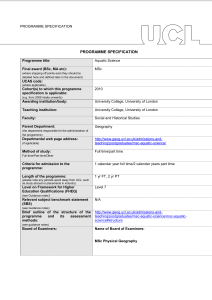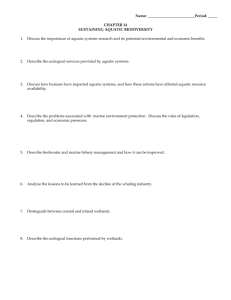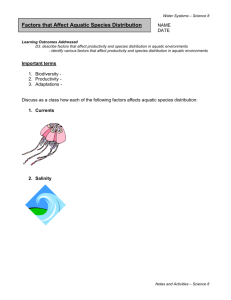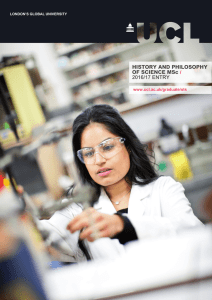AQUATIC SCIENCE MSc / 2016/17 ENTRY www.ucl.ac.uk/graduate/geography
advertisement
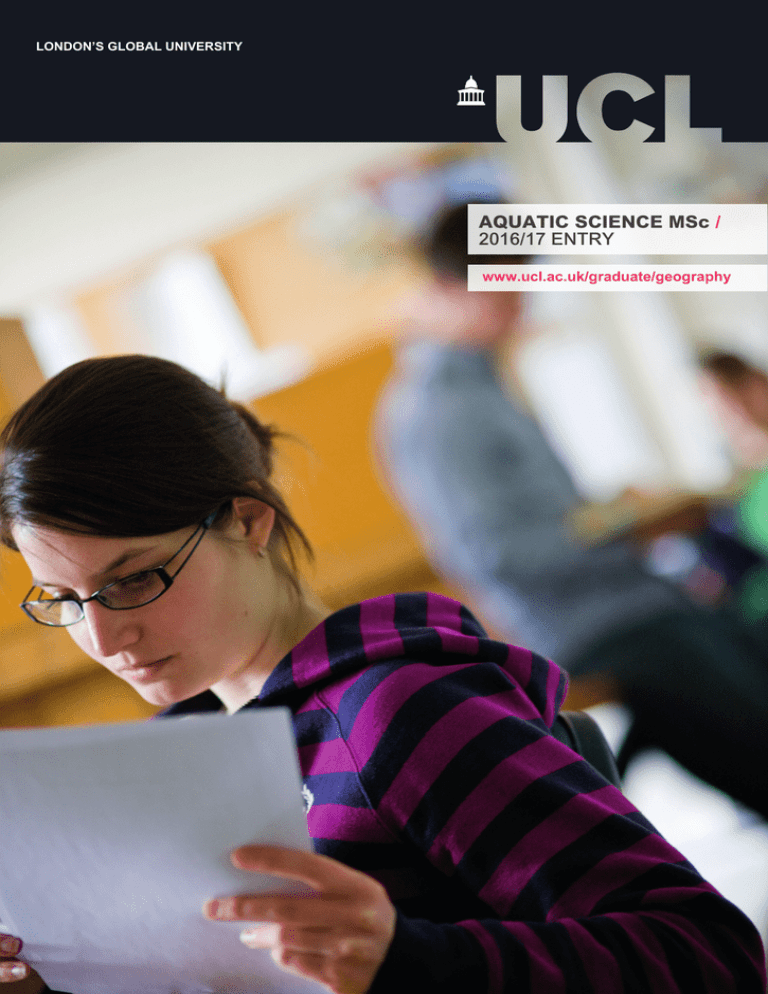
LONDON’S GLOBAL UNIVERSITY AQUATIC SCIENCE MSc / 2016/17 ENTRY www.ucl.ac.uk/graduate/geography Aquatic Science MSc / Environmental issues such as eutrophication, habitat degradation and climate change threaten the sustainability of our aquatic resources. Responding to these threats the Aquatic Science MSc equips students with an interdisciplinary understanding of the structure and functioning of aquatic environments, encompassing lakes, ponds, rivers, wetlands, groundwaters, estuaries and shallow seas. Degree structure Mode: Full-time: 1 year; Part-time: 2 years Students undertake modules to the value of 180 credits. The programme consists of four core modules (60 credits), four optional modules (60 credits) and a research dissertation (60 credits). A Postgraduate Diploma - 4 core modules and 4 option modules all 15 credits (120 credits, full-time nine months, part-time two years) is offered. A Postgraduate Certificate - 4 core modules only at 15 credits (60 credits, full-time twelve weeks, part-time two years) is offered. CORE MODULES Degree summary // Aquatic Systems // Aquatic Monitoring (includes field-trip to Scottish Highlands) Students gain a sound training in field sampling, study design, instrumentation, numerical analysis and the taxonomy of a range of aquatic organisms. Distinctive features include the integration of aquatic ecology with hydrological and geomorphological processes, analysis of sediment cores, design of aquatic monitoring programmes and modelling of aquatic system dynamics. // Environmental Data Acquisition and Analysis // Scientific Basis for Freshwater and Coastal Conservation (field-based course in Norfolk, England) // // // OPTIONS // Lakes // Coastal Change The Aquatic Science MSc is run by UCL Geography, which enjoys an outstanding international reputation for its research and teaching. // Politics of Climate Change // Marine Conservation The programme is taught by members of departmental research groups specialising in environmental change and environmental modelling, and has specialist input from the UCL Thames Estuary Partnership, and in-house aquatic consultancy Environmental Scientific Services. // Surface Water Modelling // Wetlands // Aquatic Macrophytes (field-based course in Dorset, England) // Impacts of Climate Change on Hydro-ecological Systems // Biological Indicators of Environmental Change Speakers from other universities and environmental organisations including the UK Environment Agency, the Rivers Trust, Wildfowl and Wetlands Trust, the UK Wildlife Trusts, the National Trust, Natural England, and the Centre for Environment Fisheries and Aquaculture Sciences are invited to lecture on the programme and take part in fieldwork. // Non-biological Indicators for Environmental Change // Environmental GIS The programme is delivered through a combination of lectures, seminars, practical classes, laboratory sessions, case-studies and residential field classes. Assessment is through coursework and the dissertation, which includes an oral presentation of the research proposal. DISSERTATION/REPORT // All students undertake an independent research project which culminates in a dissertation of 15,000 words. Dissertation placement positions are offered linked to external conservation bodies and research-orientated consultancies. Your career This programme provides an ideal foundation for PhD research, or for employment with environmental protection and conservation agencies, the water industry and environmental consultancies. Recent conservation sector and consultancy destinations include Norfolk Rivers Trust, South East Rivers Trust, Natural England, Environmental Agency, The Wildlife Trusts, VerdErg Renewable Energy Ltd. and Carnstone Partners LLP. Recent PhD destinations include UCL, University of Hull, University of Southampton and Queen Mary University of London. Employability The MSc provides students with the science background and practical skills necessary for a career working in aquatic conservation and environmental protection agencies, environmental consultancies and stakeholder agencies. The MSc is also an ideal platform for further PhD study. We aim to expose students to potential employers from the outset and students receive expert tuition in field sampling and monitoring programme design, conservation biology, taxonomy of key species groups, knowledge of important conservation principles and legislation and working with stakeholders. Entry requirements Normally a minimum of an upper second-class Bachelor's degree in a relevant discipline from a UK university or an overseas qualification of an equivalent standard. Applicants with relevant professional experience in aquatic science or environmental management will also be considered. English language proficiency level If your education has not been conducted in the English language, you will be expected to demonstrate evidence of an adequate level of English proficiency. The level of English language proficiency for this programme is: Good. FEES AND FUNDING // UK & EU (2016/17) entry: £9,815 (FT) // Overseas (2016/17) entry: £18,670 (FT) // UK & EU (2016/17) entry: £4,935 (PT) // Overseas (2016/17) entry: £9,285 (PT) For information on bursaries available, please visit www.geog.ucl.ac.uk/aquatic Full details of funding opportunities can be found on the UCL Scholarships website: www.ucl.ac.uk/scholarships Information about the evidence required, acceptable qualifications and test providers is provided at: www.ucl.ac.uk/graduate/english-requirements APPLICATION DATE Your application CONTACT The deadline for all applicants is 29 July 2016. Email: geog-masters@ucl.ac.uk Students are advised to apply as early as possible due to competition for places. Those applying for scholarship funding (particularly overseas applicants) should take note of application deadlines. Telephone: +44 (0)20 7679 7579 When we assess your application we would like to learn: // // // // why you want to study Aquatic Science // where you would like to go professionally with your degree why you want to study Aquatic Science at UCL what particularly attracts you to this programme how your academic and/or professional background meets the demands of a challenging academic environment Together with essential academic requirements, the personal statement is your opportunity to illustrate whether your reasons for applying to this programme match what the programme will deliver. Details on how to apply are available on the website at: www.ucl.ac.uk/graduate/apply PDF Updated: May 25, 2016 Information correct at time of going to press. See website (www.geog.ucl.ac.uk) for latest information All applicants: 29 July 2016 Ms Fiona Mannion
